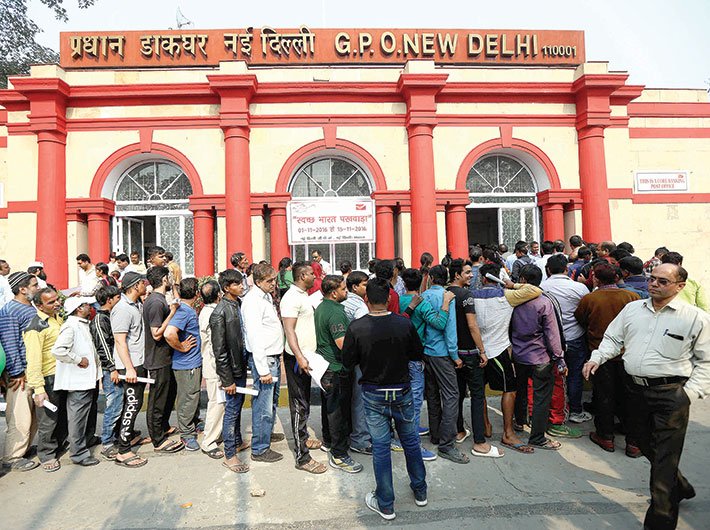On November 8, the Government of India announced its decision to pull high-value currency notes of Rs. 500 and Rs. 1,000 denomination out of circulation, with immediate effect. A detailed procedure was notified in the Official Gazette explaining how people holding the demonetised currency notes may redeem the value of the demonetised notes. The Government also permitted people to exchange over the counter, the demonetised notes for the new series of Rs. 2,000 and Rs. 500 notes printed, but to a limited extent.
Memories of a similar decision to demonetise high value currency notes taken by the Janata Party government in 1978 are being revived by scholars and lawyers writing in the print and electronic media. Noted human rights lawyer and former Additional Solicitor General of India, Ms. Indira Jaisingh has recently commented on the legality of the manner in which the Government has gone about this demonetisation decision. A bunch of petitions have been filed across the country challenging the legality of this decision. Chief amongst several is the contention that such a course of action requires the sanction of a law passed by Parliament.
Difference in currency exchange procedures of 2016 and of 1978
Having learnt about The High Denomination Bank Notes (Demonetisation) Act, 1978 (HDBND Act) for the first time from Ms Jaisingh's article, I realised I should read its provisions to better understand what is happening now, in 2016. (Not being a trained lawyer has distinct disadvantages, one of them is ignorance about the existence of several laws.) The HDBND Act was initially promulgated as an Ordinance and replaced by an Act of Parliament later on. A 5-member Constitution Bench of the Supreme Court of India upheld its constitutionality while deciding a batch of petitions from persons aggrieved by the treatment they received under this law, in the matter of Jayantilal Ratanchand Shah & Ors., vs. Reserve Bank of India [(1996) 9 SCC 650]. Several scholars have discussed this judgement in detail, in the context of the latest demonetisation drive. So I have little to add to that discussion.
However, a comparison of the currency note exchange procedures provided for in the HDBND Act with the procedures provided for in the Government's 8th November, 2016 notification, reveals what may arguably be described as a loophole bigger than the famous Lonar crater in Buldhana, Maharashtra.
* No prohibition on the 'transfer' of demonetised notes to persons (other than banks)
First, in 1978, Section 4 of the HDBND Act prohibited the 'transfer' of the demonetised notes to anybody other than Scheduled Banks after they had stopped being legal tender, in the following words:
"4. Prohibition of transfer and receipt of high denomination bank notes.— Save as provided by or under this Act, no person shall, after the 16th day of January, 1978, transfer to the possession of another person or receive into his possession from another person any high denomination bank note."
The Government's 8th November, 2016 notification and subsequent notifications involving course corrections do not contain any such provision.
Even as millions of law-abiding citizens queued up before banks across the country to redeem the value of the demonetised notes that they possessed, the print and electronic media reported late night frantic purchases of gold, soon after this decision was announced until the bullion market closed down for almost two weeks. Many people are reported to have bought railway and flight tickets only to seek refund in the new currency notes which went on for two days, when the government stepped in to plug this loophole. Several temples across the country reported unprecedented flows of cash offerings from devotees. Hardly anything has been done to stop this practice.
All such actions would have become illegal, automatically, if the transfer and receipt of the demonetised notes to any entity or person other than banks had been prohibited in the manner done by Section 4 of the HDBND Act. While the Government permitted certain kinds of transactions to ease the travails of the public, the absence of an express bar on other kinds of transfer may have resulted in what cannot but be described as 'dry-washing' of billions of unaccounted for money. However such a prohibition would have required the backing of an Act of Parliament as it cannot be done through executive fiat.
These ingenious methods used to ‘launder’ unaccounted for money reminds us of the popular English nursery rhyme - 10 little piggies went to the market. In the rhyme, the piggies fall down one by one until none is left to go to the market. In fact, this is what the demonetisation drive ought to have achieved – bring down all the piggies with black money. However. many a black piggie seem to have survived the 'surgical strike' while law-abiding citizens brave the sun and the cold standing in serpentine queues, not always successful in getting their hard earned money out of banks to the extent they require.
* No declaration of the source of the demonetised notes
Second, in 1978, Section 7 of the HDBND Act required every individual, company, trust or society intending to redeem the value of the demonetised notes to submit a declaration, in triplicate, containing the following details, apart from his or her name, contact details and other personal information (see pages 6-7 of the 1st attachment):
a) reasons for keeping the amount sought to be exchanged in high value denominations;
b) source from which the demonetised notes were acquired by the person seeking to exchange them;
c) whether the person seeking to exchange the demonetised notes had borrowed them from any person, if so, details were to be provided;
d) if the person making the declaration was not the owner of the demonetised notes, then the name of the true owner with a declaration that the notes were not held benami.
Section 7(3) of the HDBND Act authorised the manager or the person in charge of the bank where the demonetised notes were sought to be redeemed, or a salaried magistrate or a Justice of the Peace or a police officer of the rank of Inspector of Police or above to attest such a declaration by identifying the declarant.
None of these procedures for transparency and accountability are laid down in the Government's 8th November, 2016 notification. Instead para #2(v) of this notification actually permits a person to deposit the demonetised notes in the bank accounts of third parties in the following words:
"2. The specified bank notes held by a person other than a banking company referred to in sub-paragraph (1) of paragraph 1 or Government Treasury may be exchanged at any Issue Office of the Reserve Bank or any branch of public sector banks, private sector banks, foreign banks, Regional Rural Banks, Urban Cooperative Banks and State Cooperative Banks for a period up to and including the 30th December, 2016, subject to the following conditions, namely:—"
X X X
(v) the equivalent value of specified bank notes tendered may be credited to a third party account, provided specific authorisation therefor accorded by the third party is presented to the bank, following standard banking procedure and on production of valid proof of identity of the person actually tendering;"
It is not surprising that the Jan Dhan accounts became flush with funds soon after the demonetisation exercise. Shortly before the demonetisation decision the Indian Express used The Right to Information Act, 2005 (RTI Act) and spot verification procedures to show how bank officials were depositing Re. 1 in many of these accounts to reduce the number of zero balance accounts which otherwise would have indicated non-use of the accounts thereby indicating the flaws in the financial inclusion scheme. The Government is reported to have launched an inquiry into the sudden spurt in deposits in JanDhan accounts.
The rich seem to have temporarily reaped the benefits of the Jan Dhan scheme more than those for whom it was originally intended, defeating the purpose of both the de/re-monetisation and the financial inclusion exercises. What is worse, the poor seem to have become unwitting or in some cases even willing accomplices to this exercise of "dry-cleaning" unaccounted for money.
Post-demonetisation, and the manner in which it was done, is this not evidence enough to suspect that the loophole in the demonetisation scheme is being used to legitimise unaccounted for money, worth billions, as has been alleged in the print and electronic media? Could the procedures have been designed better?
* Punishment for making false declarations in 1978
Third, Section 10(2) of the HDBND Act made furnishing of false declarations punishable with a prison term extending up to three years or a fine or with both in the following words:
"(2) Whoever knowingly makes in any declaration under section 7 any statement which is false or only partially true or which he does not believe to be true or contravenes any provision of this Act or the rules made thereunder shall be punishable with imprisonment for a term which may extend to three years or with fine or with both."
However, there is no penal provision in the Government's 8th November, 2016 notification. Instead the Government has moved a Bill in Parliament to impose only a higher rate of tax coupled with some monetary penalty on those found to have deposited sums of money that were not previously accounted for. Obviously, such penal provisions cannot be introduced through executive action except an Ordinance. Even that Ordinance would have to be brought before Parliament for approval eventually.
So, by not taking Parliament into confidence about the demonetisation exercise, has the Government unwittingly ended up leaving giant loopholes open for unscrupulous people to exploit while law abiding citizens die standing in a queue or perish behind the cash deposit and exchange counters due to exhaustion? Is this another "surgical strike" as repeatedly described in the media, or is it just another 'amnesty scheme' for those who ought to have been taken to task for possessing unaccounted for millions- readers must decide for themselves. If the aforementioned provisions of the HDBND Act had been included in the current demonetisation scheme, the illegal transactions could have been stemmed to a large extent. Perhaps, queues in front of banks might have been shorter. Were all these matters thought through by policymakers, if so why are the records of deliberations on every para of the Government's 8th November, 2016 notification not being placed in the public domain?
Exercise your fundamental right to know under the RTI Act
Readers who have the right to seek information under India's RTI Act must formally ask these and more probing questions to demand disclosure of the deliberations of all public servants involved in the latest demonetisation exercise. I have attached two RTI applications that I submitted recently to the Dept. of Economic Affairs and the Reserve Bank of India asking for detailed information about the demonetisation decision (4th & 5th attachments). I request readers to feel free to use or adapt these formats to seek transparency in the decision-making process or amend the queries as they think best. This is a matter of immense public interest affecting every citizen of India. There is no reason why any of this information should be withheld from public scrutiny.
Unfortunately, instead of paying serious heed to stories of illegal transactions, people who raise such queries are being dubbed supporters of black money and corruption not only by elements in the political establishment but also by other citizens who have not thought these issues through. Many a concerned citizen wants to live in a "Swacch Bharat" instead of becoming a cheerleader for a "dry-washed" economy.
RBI demonetisation records RTI
DEA demonetisation records RTI

